Chitta Shuddhi Tirtha - Shrimad Devi Bhagwat Puran
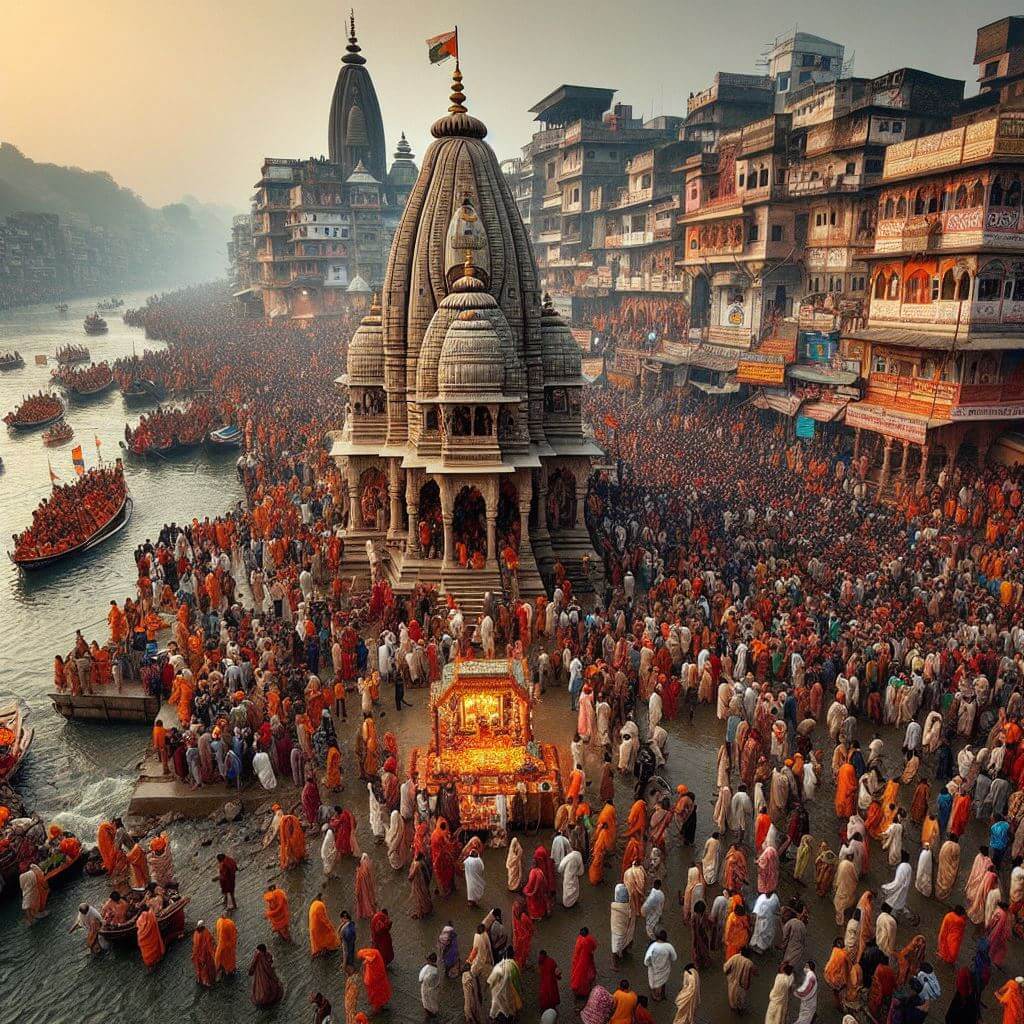
What is Chitta Shuddhi
Achieving purity of mind is called Chitta Shuddhi.
- Chitta = mind & Shuddhi = purity
Shrimad Devi Bhagwat talks about Chitta Shuddhi and describes it as a pilgrimage. It clearly explains how the purity of mind or Chitta Shuddhi can be achieved. Removing the impurities of mind has been called the best pilgrimage.
What is the Best Pilgrimage according to Shrimad Devi Bhagwat Puran and why?
According to Shrimad Devi Bhagwat Puran, Chitta Shuddhi Tirtha (pilgrimage) is the best of all pilgrimages.
Shrimad Devi Bhagwat mentions that doing pilgrimages, going to holy places, doing charity, vow, sacrifices, asceticism and good acts can cause purity of the articles (Dravya Shuddhi) and outside dirt, but purity of mind (Chitta Shuddhi) cannot be attained by these.
What is Chitta Shuddhi Tirtha
Purity of mind (Chitta Shuddhi) is only achieved if one comes in intimate contact with a man possessed with the Divine Knowledge. This is far more pious than any other pilgrimage. This is called Chitta Shuddhi Tirtha.
In Bhagavad Gita Chapter 4, Verse 34, Krishna also asks arjuna to seek the refuge of a Tatvadarshi Saint to gain the most secretive spiritual instruction. This is what Devi Bhagwat Purana is alluding to as well.
Normal Pilgrimages are a Cause of Sin - Shrimad Devi Bhagwat Purana
In Shrimad Devi Bhagwat Puran sage Ved Vyas explains that tirtha (pilgrimage) are of no use but Chitta Shuddhi tirtha is the best of all. Ved Vyas gives the example of Rishi Vishvamitra and Vashistha who used to reside by the banks of Ganga river but were full off jealousy, animosity and hatred. Rishi Ved Vyas categorically says that taking a holy dip in river Ganga cannot cause a purification of heart but at the most can wash body dirt. Therefore Chitta Shuddhi Tirtha is superior to all tirtha.
Shrimad Devi Bhagwat Puran, Skand 6, Adhyay 12
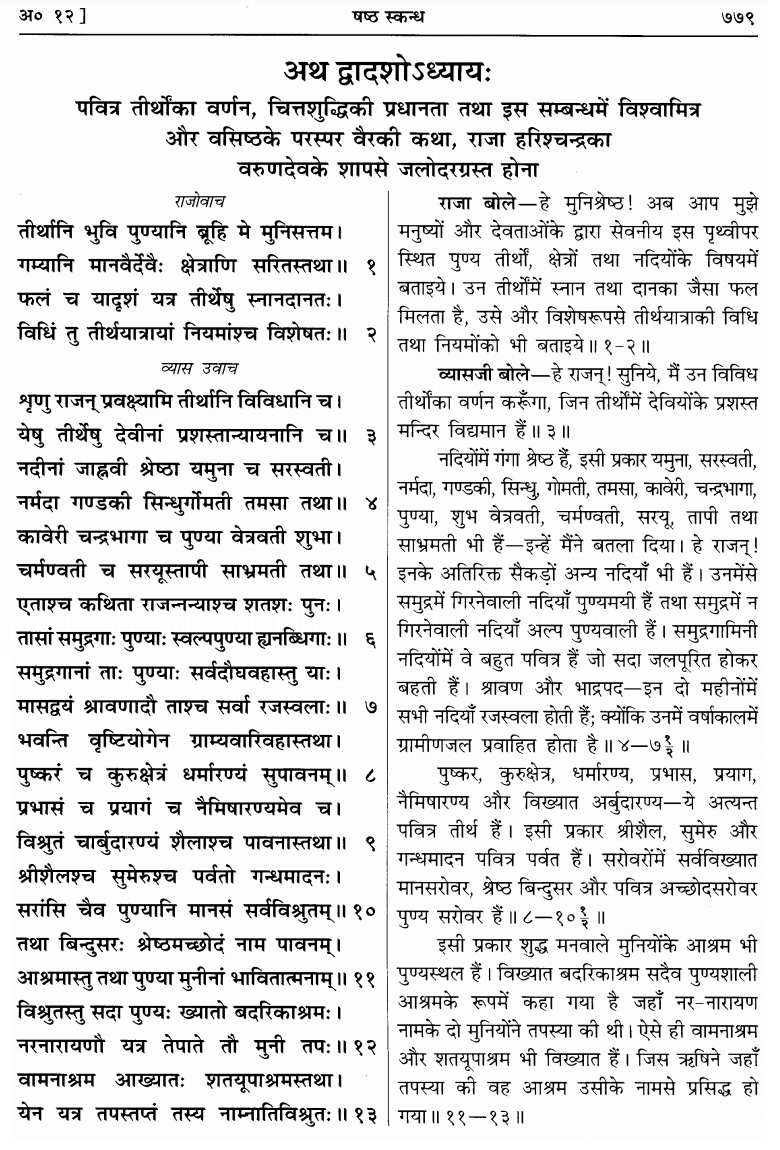
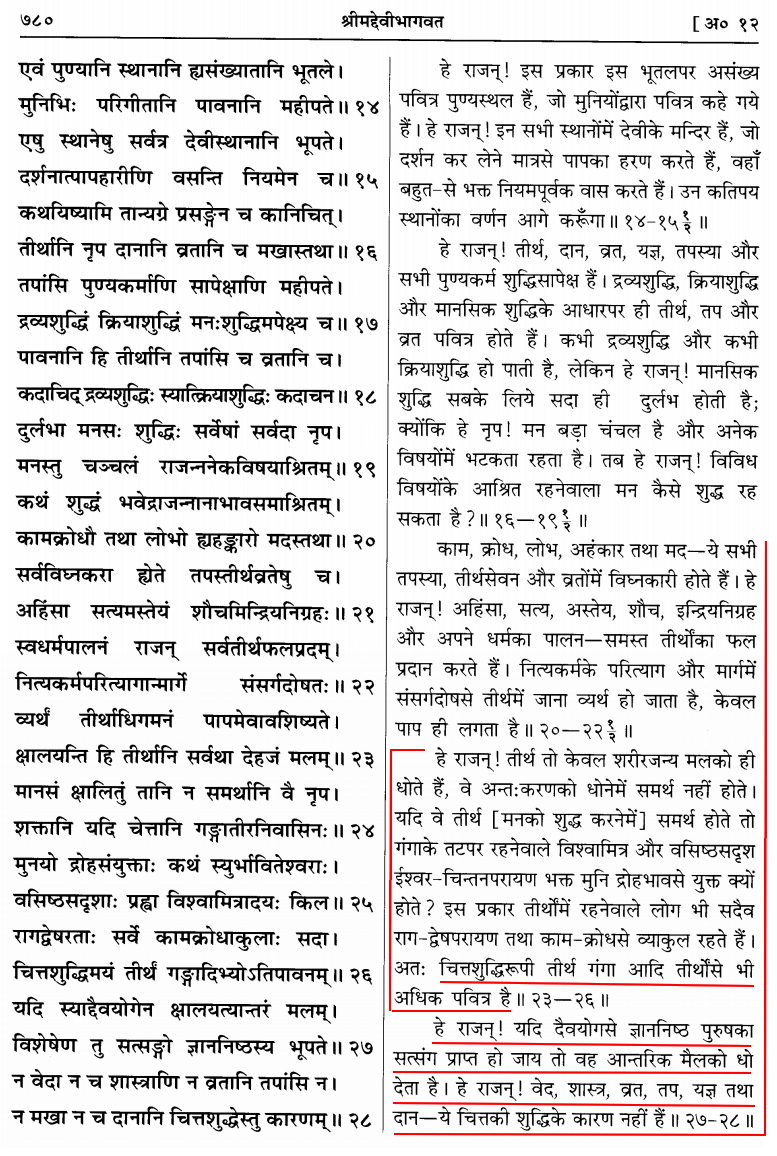
Shrimad Devi Bhagwat Puran, Skanda 6, Chapter 12
1-2. The King said “O Best of Munis! Tell me the names of the holy places of pilgrimage on the surface of this earth, the holy Ksetras and the holy rivers; what are the fruits acquired in bathing there and in making charitable gifts as well; also what are the rules of the journeys and acts there are to be conducted?”
3-34. Vyasa said :-- Hear; I am describing to you various Tirthas or places of pilgrimage as well as those that are highly extolled as the best places favourite to the Devi. Amongst the rivers the following are reckoned as chief and holy The Ganges, Jumna, Sarasvati, Narmadda, Gandaki, Sindhu, Gomati, Tamasa, Cavery, Chandrahaga, Vetravati, Charmanvati, Saraju, Tapi, and SavramatT. Besides these, there are hundreds of rivers on the surface of this earth; of them, those that fall into the ocean, they are holier and those that have not reached the ocean are less holy. Of those rivers that fall into the ocean, those that always flow with great current, they are comparatively holier; but in the two months Shravan and Bhadra (15th July - 15th September) all the rivers are considered as if they are during their menstruation periods; at this time also some rivers carry water of the rains just sufficient to supply the villagers with water.
O King! The following are the famous places of pilgrimages calculated to bestow merits:- Puskara, Kuruksettra, the holy Dharmaranya, Pravasa, Prayaga, Naimisaranya, and Arbudaranya. O King! Of the mountains, the following are considered as sacred Shrishaila, Sumeru, Gandhamadana; of the lakes, the following are very holy and very famous Manasarovara, Vindusarovara and Aksoda; these are the chief lakes. To those Munis that meditate on their Atman, all the hermitages are sacred; still the hermitage of Badri is always considered very sacred and the most celebrated; here Nara and Narayana, the two famous Munis, practised their asceticism. The Vamanashrama and Shatayupashrama are also well known; thus every hermitage is named after the Muni that practised asceticism there. Thus innumerable holy places on the surface of the earth are mentioned by the Munis as tending to sanctify the hearts of the persons. At all these holy places, the Devi is worshipped in special sites consecrated to Her. All the sins are destroyed by their mere sight. The devotees of the Devi stay there, with rules obeyed. I will mention afterwards some of these places in the course of my narrations.
O Best of kings! Going to these holy places, charity, vow, sacrifices, asceticism and good acts all depend on one another. The holy places of pilgrimages, asceticism, and observance of vows depend on the purity of the articles (Dravya Shuddhi), on the purity and one pointedness of actions (Kriya Shuddhi) and on the purity of the mind and heart (Chitta Shuddhi). Some may attain, at times, the Dravya Shuddhi and Kriya Shuddhi; but everyone finds it very difficult and, indeed, rarely get the Chitta Shuddhi.
O King! This mind always tries to seek shelter with various objects and is, therefore, always restless. How, then, can the purity of mind be effected, with ease, when it is occupied with all sorts of thoughts on various objects. Cupidity, anger, greed, pride, and egoism, these bring about all sorts of obstacles in the holy places of pilgrimages, in practising tapasya and in observing vows.
O King! Non-injury, truthfulness, non-stealing, chastity and purity, controlling of senses, and observing one’s own religion, all these bring about the fruits of the labour in visiting all tirthas. They bestow fruits that can be obtained by visiting all the tirthas. During one’s pilgrimage, one forsakes one’s Nitya Karma (daily duties) and one has to come in contact with various persons. Hence one’s journey becomes fruitless; rather it becomes a source of sin.
The waters of the sacred places can only wash the outside dirts and the impurities of the physical bodies; they can never wash the impurities of their inner minds. Were it the fact that the waters of the tirthas could purify their minds, why was it, then, that the Munis, residing on the banks of the Ganges, and devoted to God, ever indulged themselves with feelings of jealousy and enmity against each other. The humble Munis like Vashistha, and the Risis like Vishvamitra were always entangled in love and hatred and they were ever impatient with anger. Therefore it is evident that the internal purification, the purification of heart, the bathing in the Gyan Ganga flowing within, no doubt removes more the dirt than the Ganges and other places of pilgrimages.
O King! No doubt this fact must be admitted on all hands that one’s impurity of mind is washed away if by the strange combination of Fate, one comes in intimate contact with a man possessed of the Divine Knowledge. O King! The Vedas or Shastras, fasts, vows or austerities, sacrifices or gifts (charity) none can purify the heart.
Conclusion
- Chitta Shuddhi tirtha is the only tirtha that is uselful. All other tirtha are a cause of sin and therefore useless.
- One needs to find a man possessed with the Divine Knowledge i.e. a Tatvadarshi Saint to get the most secretive spiritual instruction.
Srimad Devi Bhagwat Hindi - Gitapress Gorakhpur
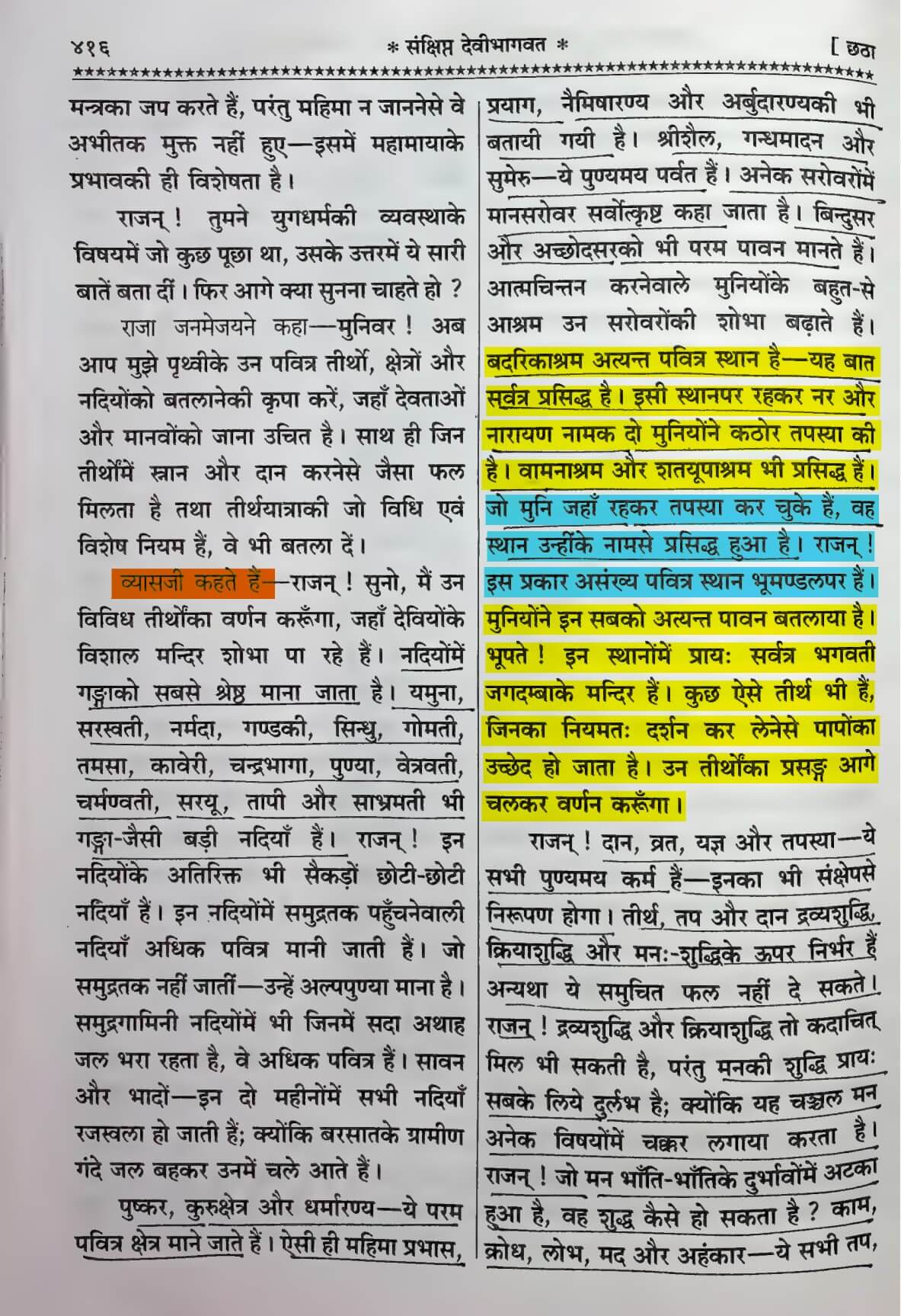
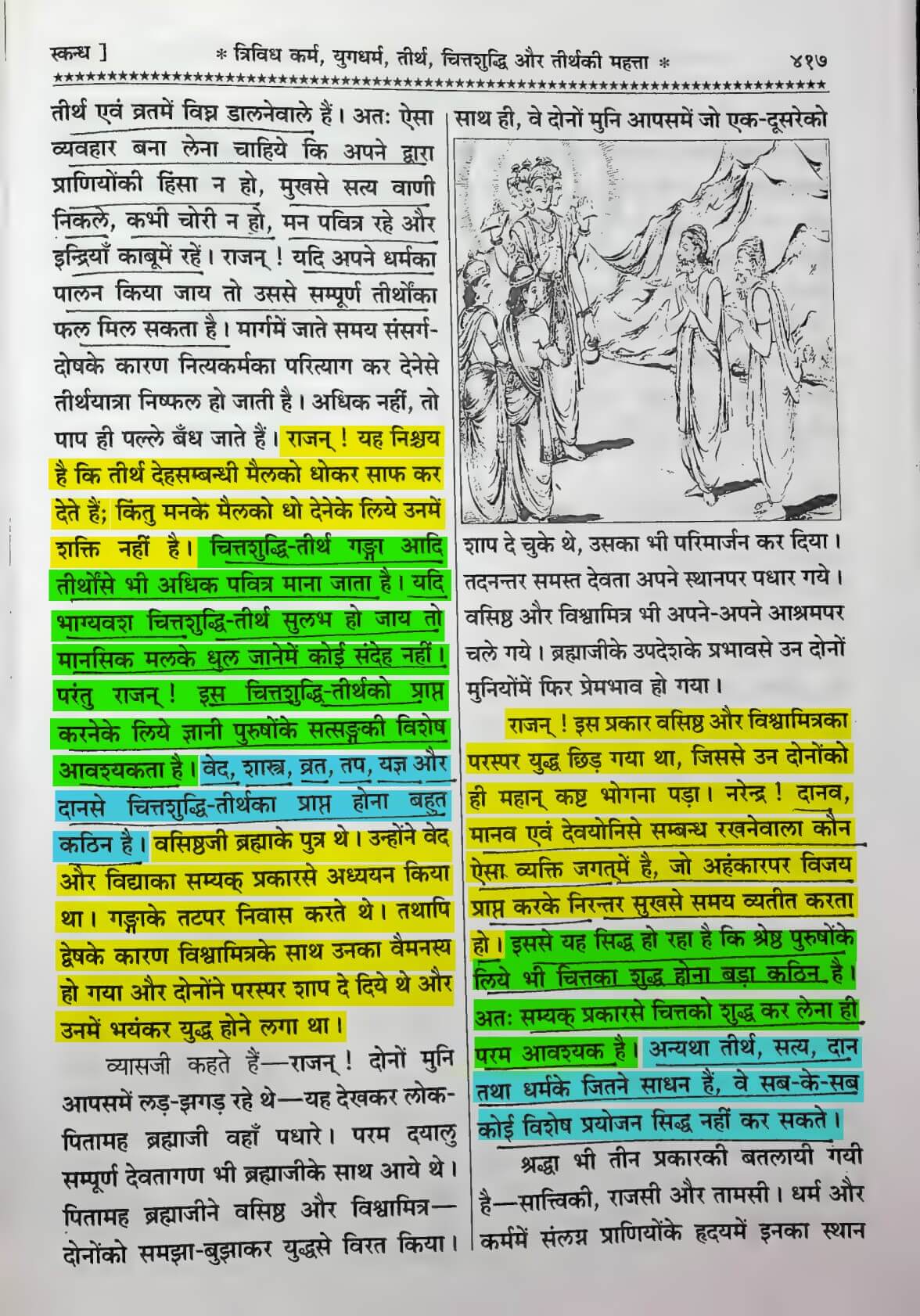
References:
Marriage of Brahma Vishnu and Shiv Karma - Shrimad Devi Bhagwat Puran
Categories: purana | Tags:
